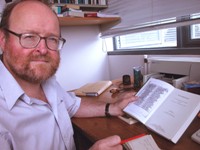Prix de La Grange

Professor David Trotter
04 June 2007
Académie des Inscriptions et Belles-Lettres rewards the work of Aberystwyth academic
Professor David Trotter, of the Department of European Languages, has been awarded the Prix de La Grange by the Académie des Inscriptions et Belles-Lettres in Paris for his edition of the medieval French text of Albucasis, On Surgery, published by Max Niemeyer Verlag, Tübingen, in 2005.
“Albucasis” is the conventional western form of Abû'l-Qâsim Khalaf ibn Abbâs 'al-Zahrâwî. Albucasis was the physician to the rulers of Córdoba in the late eleventh century. His main work, a 30-chapter compendium entitled al-Tasrif, was written in Arabic; it is of immense importance in the transmission, via Arabic, of Greek medical knowledge to the Middle Ages and beyond; but, far more than a reworking of previous writing, it is a practical surgical treatise.
Its author was clearly an active surgeon, whose text is enlivened by obvious first-hand experience. The chapter on surgery survives as an autonomous text, often richly illustrated with diagrams of the instruments. It is, indeed, these illustrations which have prompted many of the publications on Albucasis, with a number of studies of the instruments.
According to Professor Trotter Albucasis’s manual of surgery was translated, probably in the second half of the twelfth century, by Gerard of Cremona at Toledo.
“Gerard produced Latin versions of some 87 Arabic scientific treatises. Single-handedly, he is responsible for the transmission of a substantial body of Arabic scientific material to the west. The Latin text by Gerard was subsequently translated into Old French, into Occitan, but not, as far as we know, either directly or indirectly into English. There is a Hebrew version apparently taken direct from the Arabic.
“Albucasis’s influence on medicine is considerable. There continue to appear articles in medical journals which discuss his ideas and techniques. Above all, perhaps, he directly influenced the Avignon surgeon Guy de Chauliac, whose name features in the Wellcome Institute in London alongside Galen and Hippocrates. Chauliac was the most-used surgical writer up to and including the Renaissance in Europe.
“Albucasis is, then, a significant figure in the history of medicine. The medieval French translation of the treatise was made in Lorraine (eastern France) in the mid-thirteenth century. At this time, there were relatively few surgical treatises in the vernacular (and not that many in Latin) and it is amongst a handful of such texts from the thirteenth century.
“It provides practical guidance on how to carry out operations (particulary cauterization, which Albucasis was exceptionally keen on, for all sorts of conditions where the application of red-hot irons was not obviously useful – coughs and back-ache, for example). Because the text is so early, it provides first attestations of many technical words, especially derived from Arabic, and adds significantly to what we know about scientific French in the Middle Ages,” he added.
Professor Trotter’s edition is the first of this text; the 150-page text is preceded by sixty pages of introduction and nearly one hundred pages of comprehensive glossary and commentary on the vocabulary. This has been singled out for especial praise by reviewers.
The Académie des Inscriptions et Belles-Lettreshttp://www.aibl.fr/fr/present/home.html is one of five academies which make up the Institut de France (the best-known being the Académie Française itself). It concerns itself with languages, literature and culture from the Classical period until the seventeenth century, both in Europe and beyond. The Prix de La Grange is awarded annually.
David Trotter has been Professor of French and Head of the Department of European Languages since 1993. His major research activity is the AHRC-funded Anglo-Norman Dictionary project (www.anglo-norman.net), a comprehensive revision of the only dictionary of Anglo-Norman, the form of medieval French used in the British Isles.
In 2004 he organized the twenty-fourth meeting – and the first ever in Britain – of the leading international conference on Romance linguistics in Aberystwyth (four volumes of proceedings are forthcoming, also with Niemeyer, next month).
Since coming to Aberystwyth, he has published two volumes of edited essays on medieval French linguistics (1997) and multilingualism in medieval Britain (2000), thirty-seven papers and book chapters, and given sixty-five papers and lectures in Britain, France, Italy, Germany, Romania, Denmark, Canada, Belgium, Austria, the USA, Spain, Sweden, and Uzbekistan.



